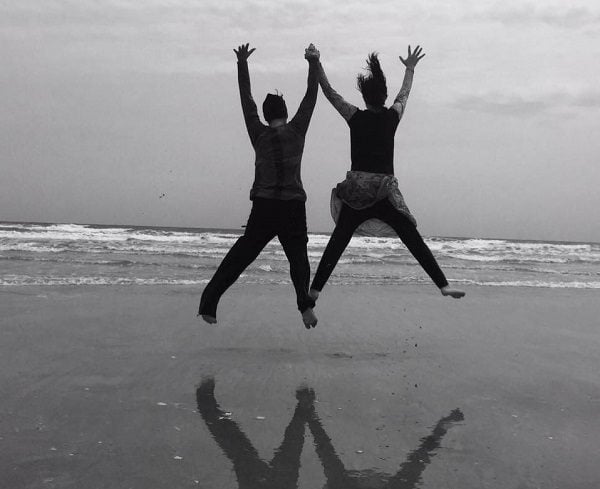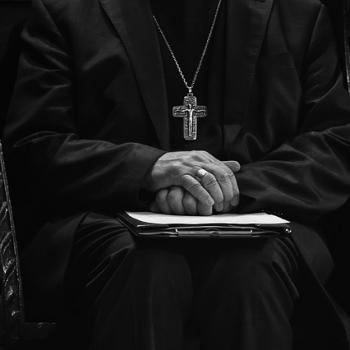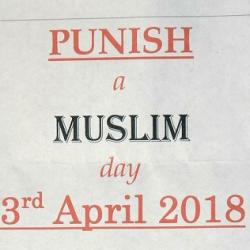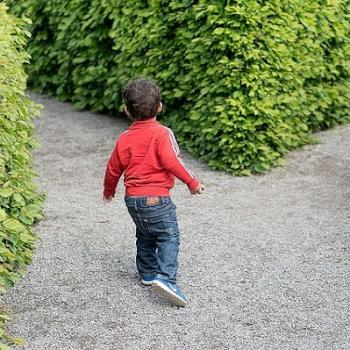
What does it mean to be “unapologetically Muslim?” Does it mean to be a loud and proud Muslim in every aspect of one’s life? Does it mean to be publicly Muslim – touting one’s Muslim-ness in every aspect of their life? Isn’t faith something to be practiced privately, between one and one’s God? And, what does it mean to teach one’s children to be unapologetically Muslim? As parents, are we pushing what our belief systems are on our children without leaving room for healthy questioning, choice and growth? Should there be room for healthy questioning, choice and growth?
Last week, an essay I penned for The Atlantic titled “Raising My Kids to be Unapologetic American Muslims” was published as part of their Parenting in an Uncertain Age series. I am proud of the piece and happy with the way it turned out through its editing iterations. As a journalist and editor for nearly two decades, it was refreshing to be back in the writer’s seat being edited by someone else, editors who helped shape my words and flesh out what I wanted to say. Also as a writer, I realized that you cannot say everything you want to say in a freelance piece that leaves questions unanswered and thoughts unexplored.
Luckily, I have this blog where I can delve into things a little deeper.
The first thing I want to mention is when I pitched this piece and wrote it, I added some text in there to remind readers that this is, indeed, a personal narrative and speaking to the stories of immigrant, first generation and second generation Muslims families, predominantly brown. There are so many other challenging American Muslim parenting stories out there that I want the general public to read – especially stories of Black Muslim American families that are unique and so important for us to hear. That part got cut out on the editing room floor.
Secondly, a lot of comments (that didn’t outright tear into me with rude and crude insults and threats of internment camps) posed some interesting questions – mainly about what being “unapologetically Muslim” or a “loud Muslim” means. In the essay I write:
I thought back to what my folks would try and convey to me in how they raised me, encouraged me, and in what they did and didn’t allow me to do. We assimilated wherever my parents felt it appropriate—watching college hockey games on Friday and Saturday nights with the whole of Grand Forks, joining the track team in junior high (still wearing my sweats), playing in band and jazz band. The practice of our faith was also maintained, with (among other things) gathering for our ritual prayers as a family at home and maintaining a halal diet in a landscape where buying halal meat and products was an enormous challenge. But in some ways, our religion was something we did quietly. The hijab was hardly seen back then, at least in the Midwestern communities I frequented. “Be unapologetically Muslim” was not something I heard at all growing up. The message was to be quietly, not loudly, Muslim.
But it’s different today. I am teaching my children to be unapologetically Muslim and American. That they have as much right to be who they are outwardly and inwardly as anyone else in this country. That they are responsible for themselves and to be good citizens and human beings of this country and this earth. That they do not need to be apologetic for whatever evils and transgressions others may commit in their cruel twisting of the Muslim faith.
When I say — regarding what I’m hearing now in my reporting and from American Muslim parents — about the message more so being conveyed to kids is to be loudly, not quietly, Muslim, it’s not a statement of volume, per se. It’s about inner strength and conviction to be true to oneself, not be ashamed of oneself, and — depending on the situation — not hiding any part of oneself. It’s not about touting one’s Muslim-ness in all public spheres.
When I was in school, admittedly I skipped whatever prayers came up during school hours and would either make them up when I got home or just conveniently not do them. (Muslims are to pray five times a day at particular times.) I’ll admit — praying five times a day when I was a kid amid a sea of people who didn’t have the same prayer rituals incorporated into their lives — didn’t have a hold on me. It took time for me to grow closer to my faith and figure out how I wanted my faith to be driving force in my life. It’s a journey I’m still on and will be on until I die.
I am raising my kids within the folds of our Islamic faith, but for them too, it is a journey. But in their journey, I am trying to instill more confidence and self worth. My nieces, mentioned in The Atlantic essay, have joined an MSA (Muslim Student Association) at their high school where they don’t discuss religion in school or do any proselytizing, but it helps them find a place to pray and organize activities where they give back to the community or bring in dynamic speakers. Upon hearing this, my daughter and other nieces decided they wanted to have an MSA at their school and took it up with their guidance counselors.
My daughter, about a week ago, requested a prayer mat from me and took that, and a headscarf (she doesn’t wear one on the regular) and stored it in her guidance counselor’s office, where they can go to pray. I don’t know if she does her prayers all the time — they’re kids, after all — but it warms me to my bones that she felt strong enough about herself to make that private ask in her school.
That’s one thing I mean by raising kids to be unapologetically Muslim.
Other people have asked me about choice versus indoctrination. Inevitably, as parents, we are raising our kids by the social, moral, religious (or non-religious), political and humanity-driven constructs that are important to us. Do children have the freedom to question us or push back against what doesn’t jive with them? That varies from family to family. I can tell you that in our house, we talk about a lot of things, and it’s not always religion. Some of us love cricket, others soccer or NCAA basketball every time March Madness rolls around. I have a soft spot for the grunge rock of the 90s, my daughter is currently in a Taylor Swift-state of mind (don’t ask). We have some shows we like to watch, books we like to read, things we like to do. We eat dinner virtually every night as a family, and I sing songs to the kids every chance I get to embarrass them and make myself laugh.
We talk about current events and politics (as deemed appropriate) in our home and try and instill a good sense of charity and humility. We make sure that our kids know that we don’t have all the answers. And yes, we discuss things about Islam that don’t make sense to us at times. We talk about faith in Allah, what that means, and what do we do with the questions we have. My kids question their father and me a lot, more so then I ever did with my parents. At some point, my kids will be adults and out of my home. How and if they practice their faith will be between them and God. I have my hopes for them and will always be there to advise and guide them, but they will live their lives.
One last thing that hardly got discussed in my essay was autism, which wasn’t the focus of the essay. But, if you are a reader of this blog, you know that pretty much everything in our family’s lives are shaped by our eldest son’s autism living. There are books to write about that. In the virtual pages of this blog, I have written books about it.
So, if you want to get to know us, and me better, it’s all right here. Loud, proud, warts, faith, autism and all.












